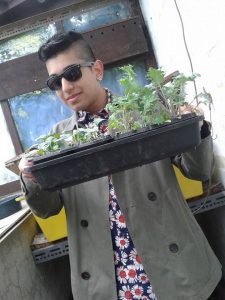Joshua Pereira, a 3rd year undergraduate studying for a degree in Biology at the University of Aberdeen, is taking on responsibility for the Really Wild Veg plots at Cruickshank Botanic Garden.
In order to fulfill the rquirements of his degree Joshua has extended the project beyond the original aims of seeing how domestication has changed the nutritional value of crop plants. He will also be experimenting to see how the various crop varieties and crop wild ancestors cope with weed competition and doing trials to assess the benefits of intercropping with companion plants that are thought to reduce pests and disease.
The Really Wild Veg project is investigating how domestication has changed crops compared to their wild relatives that can be found growing as native plants in Scotland. Last year cabbage, beet and radish were the subject of trials and this year cabbage and carrot are being grown. For more information on this year’s trial see the first blog post.
Joshua said…
The opportunity of the Really Wild Veg programme has let me extend my dissertation/project to include a public engagement element which is very exciting. It is a significant bonus to be involved with an existing project that includes RBG, Edinburgh and The Rowett Institute of Nutrition and Health. At the university I am also fortunate to have the support of the Curator of CBG, Mark Paterson and an Academic Supervisor, Dr. Michelle Pinard.
The beds at Cruickshank Botanic Garden will be:
- Bed 1: Main experiment bed containing Brassica oleracea (Wild), Kale Red Russian (Heritage) and Kale Reflex (F1).
- Bed 2: Main experiment bed containing Daucus carota (Wild), Long Red Surrey (Heritage) and Fly Away (F1).
- Bed 3: Experimental testing of Wild Brassica oleracea and Daucus carota versus weeds (This is to test the assertion that the wild sourced species have adapted to survive and grow with weeds germinating and growing in proximity and therefore competing).
- Bed 4: Experimental testing of Kale Reflex F1 and Fly Away F1 versus weeds (This is to test if F1 bred plants have vigour to out compete opportunistic weed germination and growth).
- Bed 5: Experimental intercropping of Brassica oleracea, Kale Red Russian and Kale Reflex F1 versus Shallot Ambition F1 as this crop is bred for vigour against bolting and viruses.
- Bed 6: Experimental intercropping of Daucus carota versus Radish Dragon F1 as it is a good companion plant for the carrot as it discourages predators such as the cucumber beetle, squash bug and it is bred for flavour.
In beds 1 and 2, some of the seeds were started off in the green house and some were directly sown into the ground. The seedlings grown under cover were grown in plug trays and transferred into the ground a month after sowing. The seeds that were grown in the plug trays were sown on the 5th of May 2014. These were transplanted into the ground on the 10th of June 2014.

